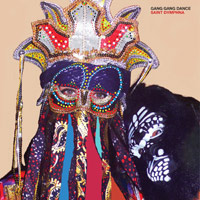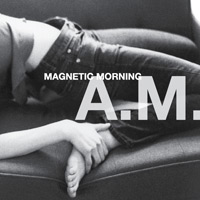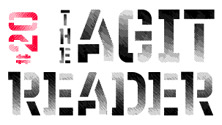
Saint Dymphna
The Social Registry
With God’s Money, it was apparent the disparate minds of Gang Gang Dance were bound for a breakthrough. Saint Dymphna is where their planets finally align and the new age exotica they broadcast orbits a buoyant pop sun for most of this year’s Dadaist party record. Long division of the band’s time card shows a validation for the wild beasts and tropical robots that inhabit the songs: the avant-noise of Cranium, psycho-folk in SSAB,and the earliest GGD recordings that pointed magnets towards worldly rhythms and neon-tribalism only to leave those ephemeral flashes floating in deep space disconnected. With a clear vision of how to harness those past fragments of the extra-terrestrial and funnel them into afrobeat and desert trip-hop, shoegaze echo and electric boogaloo, the quartet create a vibrant sensory overload that clings more to sidewalks and dancefloors than black-hole paranoia or druggy experiments.
That said, the whole of Saint Dymphna is one ecstatic experiment, beginning with the highlife guitars and disco-ball shimmer of “First Communion,” a fusion that imagines the Sugarcubes had they toured West Africa with the Arabian Prince, or better yet, “House Jam,” where vocalist Liz Bougatsos conjures up a madrigal pairing Kate Bush and Lisa Lisa while the band sugarcoats hardcore synth-fits. Even when a synapse shouldn’t be present, like wedging in the authentic grime gabber “Princes” (complete with MC Tinchy Stryder), the lines connecting the heady debris in between are crisp and infectious. There’s a punk spirit in those instrumental hyper dub plates thrown into the atmosphere, a link to the album’s namesake, the patron saint of the mentally ill and those who help them. Saint Dymphna is outsider pop serving a higher purpose, tapping into some grotesque fantasy colony contemporaries like !!! and the Liars can only find in dreams.
Kevin J. Elliott
MP3: “Desert Storm”

Car Alarm
Thrill Jockey
After seven albums that have diligently explored the common ground between free-form pop, Tropicalia and jazz, the question for the Sea and Cake must be what’s left? The leadoff cut to the eighth record in the opus the band has been carving out for more than 15 years, “Aerial,” might lead one to thinking that the answer is to “rock.” The song represents the first time the band has seemingly put their heads down and given over to more base impulses. It’s also the last. While the title track also features some guitar sounds heavier than is the band’s norm, its main train of thought is fairly off-kilter. Both songs seem indicative, in different ways, of the immediacy that characterizes the record and that’s perhaps the result of the band not hesitating after the last album and tour to produce another record. Even Car Alarm’s breezier moments—“Fuller Moon,” “Pages”— whisp by on a route more direct than the Sea and Cake’s past meandering. The album’s best moments come, though, when the band directs this spontaneous energy into tweaking their lilted pop with electronic embellishments. “Weekend,” in particular, sparkles with frenetic electricity. The resultant balance between cerebral skill and the sparks from loosened restraint may not have been the answer for which the Sea and Cake were looking, but in Car Alarm it produced some pretty good results.
Stephen Slaybaugh

Fucked Up Friends
Anticon
Full disclosure: I’ve had numerous reservations regarding Black Moth Super Rainbow. One lengthy live show was enough to write the Pittsburgh band off as a one-trick pony—Pink Floyd pummeled into beat-centric filmstrip soundtracks, black-lights and goofy nicknames in tow. The anchor, though, was built around the band’s death-star of analog keyboards, organs and Moogs. Regardless of the redundancy, the hypnotic ascent of their layered psych-synths was a smokescreen in and of itself. Tobacco, the Rainbow’s brainchild, is usually flanked by a spread that rivals Keith Emerson minus the Persian rug. As a solo artist, with a record that boasts “no samples used,” he’s engulfed himself in even more piles of wires and coils, oscillators and 808s.
It was probably the Anticon tag that gave pause, as I’m also not the biggest fan of their stable of absurdist backpack beats. But in the guise of a hip-hop producer Tobacco is given free reign to let his freak grooves soar like a collaboration between Madlib and Boards of Canada. All of the dusty funk and prog-rock fills would serve as a perfect platform for MF Doom, instead Tobacco gives each song a lyrical narrative without words, save for the occasional light of vocoded voice as on “Truck Sweat” or the obligatory addition of dystopian wordsmith Aesop Rock on “Dirt.” The song’s a jarring miscue in a sonic landscape inspired by vintage sci-fi, blaxploitation, Saturday morning cartoons, broken 8-bit Atari cartridges and the Free Design. Fucked Up Friends finds Tobacco tripping through friendlier but equally kooky territory as his band does nightly. Sans guitars and live drums, though, he’s still capable of incredible feats, even when the treads wear a bit thin.
Kevin J. Elliott

A.M.
Friend Or Faux
A.M. represents the full-length fruition of a new musical partnership between Swervedriver singer and guitarist Adam Franklin and Interpol drummer Sam Fogarino. After being introduced by my editor at the Big Takeover, Jack Rabid, the two hit it off immediately, trading songs via email and eventually recording a self-titled EP, released last year.
The collaboration is truly, er, collaborative, with Fogarino writing songs in addition to his drum duties. Leadoff cut “Motorway” seems particularly evocative of both parties’ pasts, motorik beats meshing with ringing, phased guitars. But elsewhere, the two combine for cuts that are just as unexpected as they are exceptional. “Come Back” is a majestic melding of darkened tones and slow building atmospherics. “And I Wonder” is a real stunner, though, a glacial flow of guitars, keys and unfolding dilemma. Similarly, the majority of the record finds the pair exploring platonic textures rather than trying to be overtly earth shaking. As it happens, that’s plenty jarring.
Stephen Slaybaugh
ALBUM REVIEWS
Deerhoof, Offend Maggie
Holly Golightly and the Brokeoffs, Dirt Don't Hurt
Rachael Yamagata, Elephants... Teeth Sinking Into Heart
Dungen, 4
Juana Molina, Un Dia
Crystal Antlers, Crystal Antlers EP
Fucked Up, The Chemistry of Common Life
Catfish Haven, Devastator
TV on the Radio, Dear Science
Mogwai, The Hawk Is Howling
Tom Morello, The Fabled City
Portugal. The Man, Censored Colors
Brightblack Morning Light, Motion to Rejoin
Tindersticks, Hungry Saw
